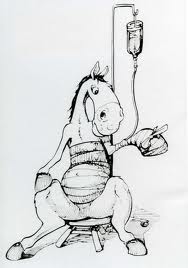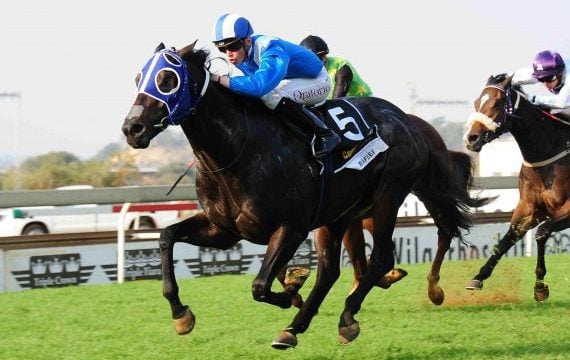On 16 April 2014, Dr Aaron Motsoaledi, the Minister of Health, signed an amendment to the Medicines and Related Substances Act 101 of 1965. In it, he changed the scheduling of Phenylbutazone (commonly known as ‘bute’ and dispensed in South Africa as Equipalazone) to a schedule 7 drug. This was published in Government Gazette 37622 dated 8 May 2014.
Schedule 7 substances include things like narcotics and according to Act 101, section 22 (9) (a) it is illegal for any person to “acquire, use, possess, manufacture, or supply any Schedule 7 or Schedule 8 substance, or manufacture any specified Schedule 5 or Schedule 6 substance unless he or she has been issued with a permit by the Director-General for such acquisition, use, possession, manufacture, or supply: Provided that the Director-General may, subject to such conditions as he or she may determine, acquire or authorise the use of any Schedule 7 or Schedule 8 substance in order to provide a medical practitioner, analyst, researcher or veterinarian therewith on the prescribed conditions for the treatment or prevention of a medical condition in a particular patient, or for the purposes of education, analysis or research.” Which in plain English means that with immediate effect it is no longer legal to possess or administer bute without a permit from the Director-General of the Department of Health.
What is bute?
Phenylbutazone, often referred to as “bute”, is a nonsteroidal anti-inflammatory drug (NSAID). This is the same class as the commonly used Ibuprofen and Aspirin. Phenylbutazone originally came into general use in human medicine in around 1949 for the treatment of rheumatoid arthritis and gout. However, it is no longer approved for human use due to its potential side effects, which include the suppression of white blood cell production and aplastic anemia.
However, bute is one of the most commonly prescribed medicines in equine practice, used in horses for its anti-inflammatory and analgesic effects. It is particularly useful for lowering fever, for the treatment of orthopaedic pain (lameness) and is still an accepted race day medication in the USA.
The medication was historically classified as a schedule 4 drug in South Africa, but approximately 2 years ago it was changed to a Schedule 6 substance, meaning that it could still be obtained on prescription. Now it has been reclassified as a Schedule 7 and with no prior warning or withdrawal period, animal healthcare practitioners and owners alike have been left reeling.
Veterinary opinion
I spoke to Dr Alison Sheppard, the immediate past President of the South African Equine Veterinary Association (SAEVA). She told me “We don’t have all the facts at our fingertips just yet and unfortunately for the time being, we are also in the dark. It was gazetted on 8 May 2014, but we only became aware of it on Monday (12 May). Our biggest concern is the welfare issue, as there has been no time to prepare for any viable alternatives. For many years bute has been the best NSAID on the market, in terms of its efficacy, its price and the fact that it’s also available in an oral formula. There are other anti-inflammatory drugs on the market, but none that fall in the same category and are available in an oral formula match bute in terms of pain relief. SAEVA will be meeting with the Veterinary Council on 26 May and we intend to pursue channels through DAFF and the Director General of Health to see what our options are. For the time being, we are advising our members as information comes to light and owners and concerned parties are advised to contact their local veterinary practice.
Wholesalers
Ian Smith is the responsible pharmacist at Virbac and said that the move is almost unprecedented, certainly in his career. “I’ve never known anything as draconian as this. Bute is now in the same category as heroine and LSD and everyone without a permit is a criminal!” He confirmed that they had cut down on their stock of the drug since it was reclassified as a Schedule 6 as their sales have dropped, but feels that there is still a place for it in companion animals (horses and game). Virbac has applied for a permit for their existing stock and are obtaining the requisite permissions to destroy it according to the correct channels. They are also offering to accept and credit vets and wholesalers for any unopened stock, purchased from Virbac and accompanied by a receipt, valid until the end of May. “This is a voluntary withdrawal, not a recall.”
Why?
The reasons for bute’s reclassification are currently unclear. One theory is unauthorised use in humans, the other that the drug might be entering the human food chain via the meat industry. At the time of going to print, the Sporting Post has been unable to get clarity from the Department of Health or the Medicines Control Council.
What are our options?
The main oral alternative is Metacam. Injectable options include Finadyne, Ketofen, Rimadyl and Metacam. However, the withdrawal time for these drugs differs from bute and vets and trainers will need to familiarise themselves with the elimination times for each if used in competition animals.
A leading local veterinary practice confirmed that they are looking into either importing alternatives or even commissioning a local compounding pharmacy to manufacture something suitable. For the time being, people are asked to consult with their local veterinarians until more information becomes available.











